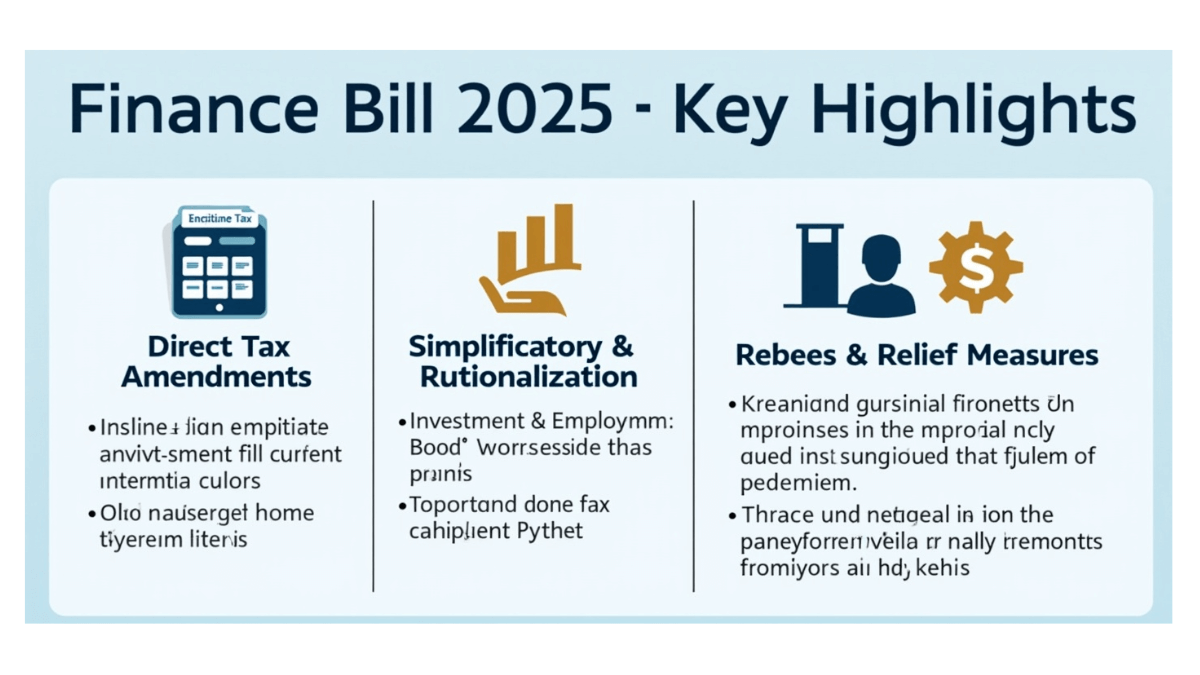
08 Mar Understanding the Key Provisions in the Finance Bill 2025
The Indian government recently introduced the Finance Bill 2025, bringing significant amendments to tax laws, investment incentives, and economic policies. This blog delves into the key highlights of the bill, focusing on direct taxes, investment incentives, simplifications, and rationalization measures.
1. Direct Tax Amendments
Income Tax Rates for Assessment Year 2025-26
The Finance Bill 2025 proposes no changes to the tax rates applicable to different income groups. The existing tax rates under section 115BAC remain the same, with the following slabs:
| Total Income (INR) | Tax Rate |
|---|---|
| Upto 3,00,000 | Nil |
| 3,00,001 – 7,00,000 | 5% |
| 7,00,001 – 10,00,000 | 10% |
| 10,00,001 – 12,00,000 | 15% |
| 12,00,001 – 15,00,000 | 20% |
| Above 15,00,000 | 30% |
Surcharge Adjustments:
- 10% for income above INR 50 lakh
- 15% for income above INR 1 crore
- 25% for income above INR 2 crore (except certain dividend income where it’s capped at 15%)
Additionally, the Health and Education Cess remains at 4%.
2. Measures to Promote Investment & Employment
Boosting IFSC (International Financial Services Centre)
The government has proposed tax exemptions and extensions for incentives to encourage investments in IFSC:
- Tax exemption on proceeds from life insurance policies issued by IFSC insurance intermediaries.
- Capital gains exemption for ship leasing units in IFSC, similar to aircraft leasing benefits.
- Extension of tax benefits for start-ups in IFSC until 2030.
Incentives for Sovereign Wealth Funds & Pension Funds
To encourage long-term investments in India’s infrastructure, the sunset date for tax benefits for Sovereign Wealth Funds and Pension Funds has been extended from 2025 to 2030.
Simplified Regime for Fund Managers in IFSC
A simplified tax regime has been proposed to attract global and regional corporate treasury centers to IFSC by removing the classification of certain intra-group loans as dividend income.
3. Simplification and Rationalization Measures
Changes in Taxation for Charitable Trusts
- The registration period for small trusts (income below INR 5 crore) is extended from 5 years to 10 years, reducing compliance burdens.
- Minor defaults in registration will no longer result in automatic cancellation of tax benefits.
Updates to Presumptive Taxation & Tonnage Tax Scheme
- Presumptive taxation introduced for non-residents providing technology services for India’s electronics manufacturing sector.
- Tonnage tax benefits extended to inland vessels to promote waterway transportation.
TDS & TCS Reforms
Several TDS (Tax Deducted at Source) and TCS (Tax Collected at Source) provisions have been rationalized:
- TDS on insurance commission reduced from 5% to 2%.
- TDS thresholds increased for various transactions, including interest on securities, rental payments, and professional fees.
- TDS on lottery winnings will now apply per transaction instead of aggregate annual winnings.
4. Rebate and Relief Measures
Section 87A – Increased Tax Rebate Limit
- The rebate threshold under section 87A is increased from INR 7,00,000 to INR 12,00,000.
- This effectively means individuals earning up to INR 12 lakh per year will not pay any income tax after availing the rebate.
Capital Gains Taxation Adjustments
- Clarifications on taxation of ULIPs (Unit Linked Insurance Plans)
- Capital gains from unlisted securities held by investment funds will now be classified under long-term capital gains.
Conclusion
The Finance Bill 2025 aims to balance economic growth with taxpayer relief, offering incentives for investments, particularly in IFSC, infrastructure, and technology sectors. Rationalization of tax laws, TDS reforms, and simplified compliance measures reflect the government’s focus on ease of doing business. While direct tax rates remain unchanged, the rebate extension up to INR 12 lakh is a significant relief for middle-class taxpayers.



No Comments